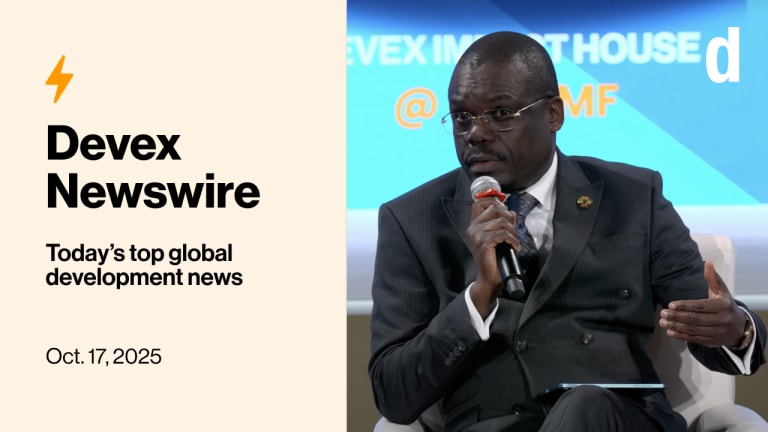
As the #Aidtoo movement continues to unfold, some in the community are remarking on the speed and ferocity with which the public mood has turned against aid. Wondering how much of the outcry was opportunistic or downright malicious, they have met criticism with defensive cheerleading. It is an all too familiar pattern for our industry, rooted in a siege mentality. A mentality that is easy to understand and relate to, but that may no longer be a viable strategy for protecting our sector.
It is almost too easy to attack the aid industry.
Foreign aid is, above all, a useful punching bag for certain corners of the conservative movement: a proxy for big government, a tangible expression of internationalism, or simply a cheap way of scoring rhetorical points and establishing a conservative bona fide. This relentless wave of criticism is enabled by a general public in donor countries that often has only the slimmest idea of what aid actually does or how development happens, aside from vague notions of starving children or corrupt dictators. Most importantly, perhaps, the aid community itself is currently a small, isolated constituency. It does not wield enough social, economic, political, or cultural influence to gain allies outside its own circles.
The financial crisis of 10 years ago created a window for conservative governments to push forward an ever-more demanding system of checks and constraints on foreign aid organizations, part of what former USAID Administrator Andrew Natsios called the "counter-bureaucracy." The combined demands of relentless transparency, value-for-money bean counting, and an ill-conceived version of the results agenda have forced funders and providers into a survival logic, which allows for essentially two types of intervention: measurable-yet-superficial or transformational-yet-obfuscated. Aid organizations have weathered the rise of the counter-bureaucracy by promising technical fixes — or pretending to promise then.
I do not think this is a sustainable strategy going forward.
As the #Aidtoo moment demonstrates, sceptics will always be ready to jump at an opportunity to bash charities and agencies. Those opportunities will only become more frequent as time goes by, because the world of traditional development assistance is getting smaller and more complex. Philanthropists and foundations are investing in smart fixes to humanity's basic problems. South-South cooperation is injecting billions into capital-intensive infrastructure. And an increasing number of developing country governments are accessing private markets to supplement their budgets.
These are all positive things, but in combination they reduce the scope of action for bilateral donors and many providers to either intractable countries, such as the Democratic Republic of Congo and Afghanistan, or intractable problems, such as fundamental institutional transformations that will take decades to prosper. Either way, say goodbye to quick and painless results.
Development assistance is getting harder just as the legitimacy of the entire the system is weakening. The elite consensus on the value of foreign aid was based on the liberal internationalist ethos of the post-World War II era. While born out of geopolitics, the system largely expanded due to adherence by political leaders to principles of humane internationalism. Principles that are now under direct attack by populists, reactionaries, and nativists. Meanwhile, the academic community — a potential ally — is increasingly disconnected from the political realities of practice, with scholars either focused on philosophical issues of social justice, or on technical issues of management. There are very few people left, outside the aid industry proper, who either willing or able to articulate and communicate the moral value of foreign aid.
This is the vacuum that aid sceptics and opportunists step into, largely unchecked. And when they contaminate public discourse with rhetoric on "Beltway bandits," or "aid fat cats," or corrupt dictators, all we have to offer in return is a relatively more benign but equally misleading picture of mothers carrying sick children, village solar panels, and cheerful classrooms. We may take comfort in reflexive op-eds, but in the end we in the aid community are complicit in public misperception and ignorance, and therefore in our own isolation.
If the current strategy is not sustainable, what then?
We need to craft a new discourse around aid that makes taxpayers proud of what they fund, and that is honest with them about the enormity of the task, but also about the intrinsic moral value of the payoffs. We should make room in our narratives for the real protagonists of development: not us, but developing-country reformers, advocates, public servants, entrepreneurs, people who push for change over the long term, and for whom we are but temporary allies. We need to articulate the purpose of development as one that straddles partisan divides: not big government or neoliberal markets, but building more accountable governments, fairer markets, and freer societies. Above all, we need to dispel the technocratic illusion and explain that, just like politics at home, development policy can be messy, inefficient, or downright silly, but also rewarding, transformative, and inspiring.
It is time to step out of the trenches, break the siege mentality, and offer the public an honest look at the reality of what we do. Our best allies are potentially those who we have left in the dark for so long.








